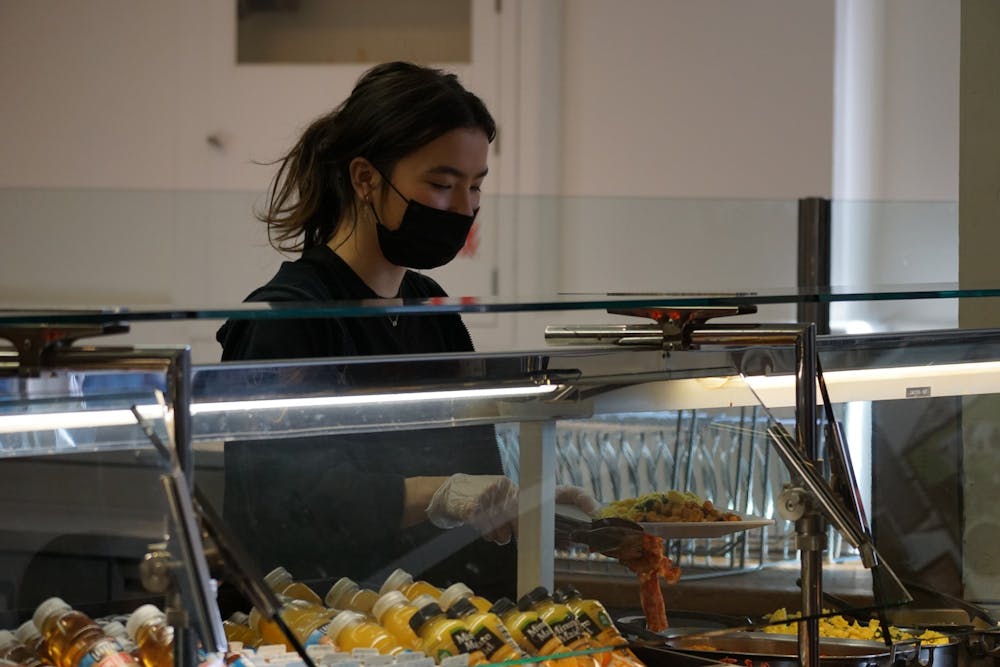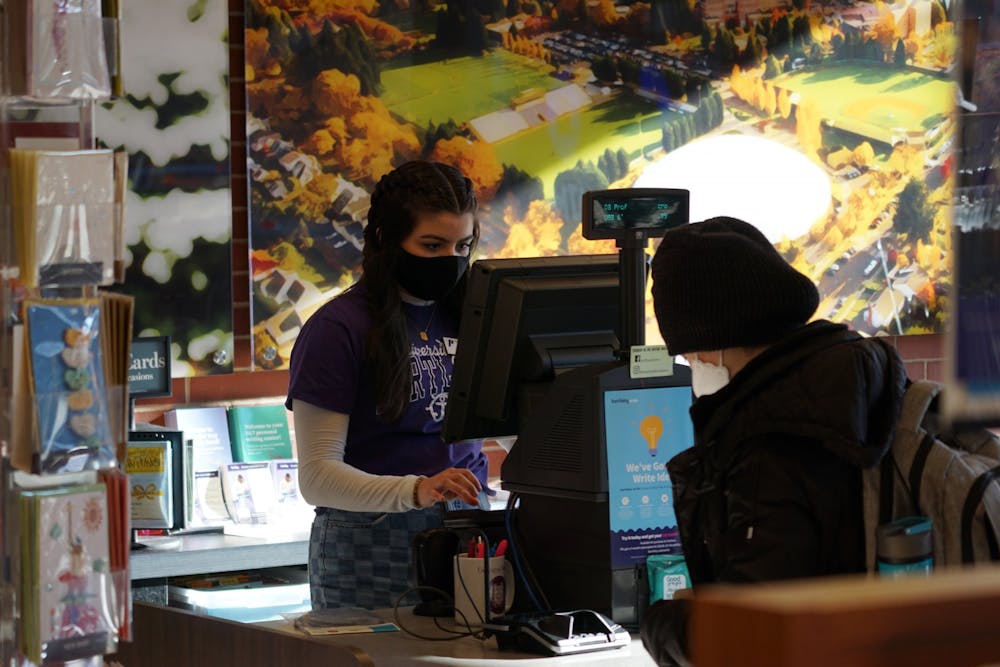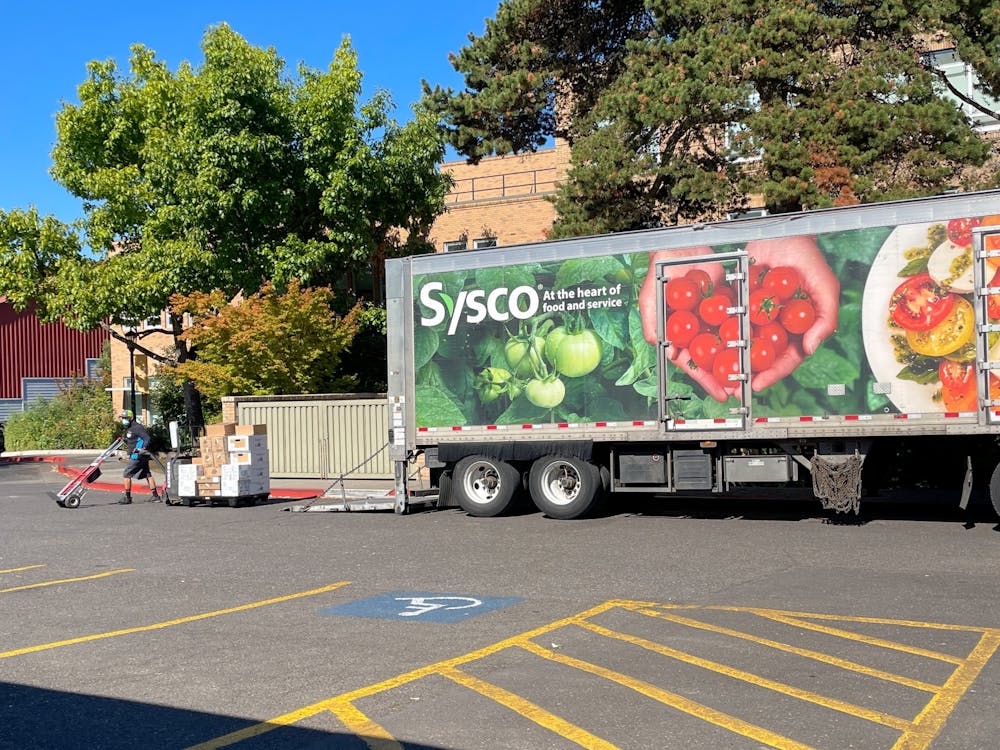Whether you’re looking for a job to finish out this semester, to carry into the summer or to plan ahead for the fall, most students don’t need to look any further than their own campus. The Beacon has compiled a list of some of the most popular student jobs available on The Bluff, whether you’re looking for a few hours of work or just want to meet some fun coworkers. All student jobs can be browsed here.
Commons (Front of the House):
You’ve probably recognized some familiar faces from your classes working the registers or serving food when you walk into the Commons. Sophomore Kaya Olson has worked at the front of the house for the Commons and has enjoyed how student-friendly the job is.
How are the working hours?
“It's really flexible. I think I work about eight hours a week and I get to choose,” Olson said. “If I can't ever go, all I have to do is send an email saying, ‘Oh, I have to study. Oh, I have plans’. Even if someone doesn't cover my shift, I still don't have to go to work, which is just really nice and different from other jobs.”
What does a typical day on the job look like?
“If I'm setting up I'll get out the plates and the serving utensils,” Olson said. “And then I'll log onto one of the registers. And service things, just chatting people up for what they want, or sometimes I'm serving it to them. And at the end I'm wiping tables with the disinfectant, reloading the silverware, reloading the condiments, taking out the trash, maybe other things. It is anything else it might entail.”

Sophomore Kaya Olsen serving breakfast.
What are some benefits of your job?
“A major benefit is you get free food during your shift,” Olson said. “You get whatever you want whenever you’re working. I love to taste test, a little bit of everything. And since I'm working I know what is hot and fresh, so I can get it right when it's hot. And also the free fruit you can take, the drinks and the fruit while you're working, like it's no big deal, which is really nice.”
What’s the work environment like?
“The adults you work with are really nice, very hardworking people,” Olson said. "And it's nice they have a really great energy and are always upbeat. They play fun music and are really welcoming. Maybe they can seem intimidating but they're hella nice and cool.”
What’s the application process like?
“It was so easy,” Olson said. “Right now, they're really understaffed, and it's one of those jobs anyone could do. It's pretty easy to learn, not very difficult at all, they just need people to do it. I didn’t even have an interview. I just submitted my resume and they're like, ‘Okay, when can you start?’”
What is your favorite part about your job?
“I think my favorite part of my job is just being able to say hi to everyone,” Olson said. “You can recognize a lot of the people you get to see. You can have many conversations that you wouldn't normally get to have because you're in an intimate space where it's just you and them serving them food so you have time to say, ‘Oh, are you in my class? Oh my god, what do you think of the professor?’ You don't really get that anywhere else.”
Campus Bookstore:
During syllabus and finals week, the bookstore is hands-down one of the busiest places on campus. During the other 13 weeks, not so much. Freshman Abby Guzman has been working at the bookstore since last semester and enjoys how convenient and simple the job is for students.
How are the working hours?
“They're super flexible, the manager does the scheduling,” Guzman said. “She sends out emails making sure that your availability is caught up. She's very good with hours and as long as you communicate like she does really well. Hours are very dependent on what time of year it is. Like right now, I only have two hours a week because there's no sales, people aren't buying textbooks. But when it's busier — like syllabus week — I had like 20 hours.”
What does a typical day on the job look like?
“Syllabus and finals week, they're our busiest weeks and they kind of run the same,” Guzman said. “There's like a whole extra thing of registers, but they're just for textbooks. So there will be somebody there who will take textbooks or be giving textbooks. Somebody else would be looking at all the online orders and processing all those orders. You'll be printing out lists of textbooks and names and so you have to get all the textbooks together, put them in bags, very organized because we can't be giving out the wrong textbooks. And then aside from that, all of our textbooks are shipped so we have to go through every single box and sort all the textbooks out by alphabetical order.”
What are some benefits of your job?
“I don't think I would have been able to get another job that is not on campus because I don't have a car,” Guzman said. “So it's super convenient. Another really convenient thing is the discounts that we get there. We even get discounts on textbooks and stuff, so buying textbooks wasn't a huge concern like every little bit helps.”

Flexible hours and discounts on textbooks are some reasons why Guzman finds working at the bookstore very convenient as a student.
What’s the work environment like?
“A lot of times it's just one or two of us, especially right now that it's not busy,” Guzman said. “I've never experienced any type of crazy mean coworkers or customers, people are really kind there. Management's really understanding and very helpful whenever it comes to anything because a lot of it is circumstantial stuff you need to learn, so they can't really teach it to you right away. So, it's just that they're very helpful for everything.”
What’s the application process like?
“You get the job through Barnes and Noble, not through the school,” Guzman said. “It's a very easy application process. You put your resume and it just asks you questions, so you do that and then from there, Melanie, the manager, she'll see it, and then she’ll go over your resume, your questions, everything and decide if you should get an interview or not. They interview you and then they decide to keep you type of thing.”
What is your favorite part about your job?
“Honestly, my favorite part is probably the sorting of either books or merchandise,” Guzman said. “It’s just so calming. Obviously, I don't mind talking to people and like doing that aspect either, but, it's just such a calming experience. When you're done, it looks all pretty. It's just such a satisfying experience to finish the project and it looks really nice.”
Residence Life Community Assistant:
In the lobby of each residence hall, the CA’s are sitting at the desk ready to greet whoever walks through the doors. Freshman Josué Garcia has been a CA at Christie Hall since the beginning of the year and likes the sense of community that he finds at his job.
How are the working hours?
“They usually only let you work two hours at a time,” Garcia said.” So if I have a shift from nine to 11, I can't work from nine to one in the morning. And they're pretty flexible, with stuff like mock trial. I've had to call in and they've just had someone else cover my shift.”
What does a typical day on the job look like?
“On a weekday, it's usually from like 8 to 10:30,” Garcia said. “So then it's just, people walk in saying hello, maybe some might have a conversation with me. Usually during that time, I'm also getting some homework done or doing something else. And then for the weekends, I typically don't see a whole lot of people, especially from the 11 p.m. to 1 a.m. shift, because mainly people are just sleeping during that time or they're out.”

One main role of the Community Assistant is to welcome anyone who enters the hall.
What are some benefits of your job?
“Some of the benefits are just being able to do homework while on the job,” Garcia said. “I can do my own thing.”
What’s the work environment like?
“It's very community driven,” Garcia said. “I know most of the people that come in here, and I know them by name, and I'll say, ‘Hey, how's it going?’ You know, just talk to them. But it definitely helps build a more sense of community.”
What’s the application process like?
“I got in contact with the hall director, and just talked to him at the start of the year,” Garcia said. “We didn't really have a lot of people applying for the position, so I reached out to him in person and then he just told me to go through the process and then he would just interview me later, but it was fairly simple.”
What is your favorite part about your job?
“The fact that I can do homework on the job, it really does help out because then it sets my mindset to just be like, ‘This is what I'm gonna do for this shift,’” Garcia said. “I'm gonna get it done, and I can't procrastinate.”
First-Generation Student Ambassador:
The First-Generation Mentorship Program (FGEN) is a fairly recent program but it has been a growing part of campus life this year. Sophomore Sophia Osuna has actively worked for the mentorship program this school year. She feels passionate about helping first-generation college students navigate their first year in college.
How are the working hours?
“We have consistent hours in terms of weekly staff meetings that we have, which is one hour a week,” Osuna said.” And then you can also choose to be part of the social media team within FGEN as well which gets you more hours. So you kind of just take on what you can. I would say it's flexible for sure.”
What kinds of tasks are you given?
“Every semester we're assigned a certain number of mentees who are incoming first year or transfer students who opt into our mentorship program,” Osuna said. “Then we meet with those mentees bi-weekly and then are there to offer support and help those individuals navigate college experiences so we're able to offer that support. In addition to mentorship, we also run and host and facilitate events on campus. A lot of those have to do with socials that we do for the FGEN community and certain events where there are speakers who are offering guidance. The last portion of my job is working for the social media team. Within the social media team, you brainstorm ideas for the Instagram account. We also have a podcast and there's a team within that as well that works on editing and recruiting people to be guests.”
What are some benefits of your job?
“The cool thing about FGEN is that we do have a paid team training over the summer, which includes some bonding,” Osuna said. “Last summer, we went to the zoo in Portland, which was really cool, it's how we kind of got to know one another. And then we had training on how to be competent mentors to incoming FGEN students. Another benefit of the job is the time that we get to have together in those weekly staff meetings is consistent so we're able to build connections with each other there. We don't go long periods of time without seeing one another. We get to have that kind of sense of community.”
What’s the work environment like?
“Working with mentees can be a really personal and intimate experience, depending on how much your mentee decides to disclose with you,” Osuna said. “Working with fellow ambassadors, we collaborate as friends but also as colleagues. A lot of the work we're doing is fun and feels very light but also understanding the circumstances that our community experiences or the barriers that we might face kind of adds on a certain level of intensity to the job. Because the barriers aren't just like conflicts within our team, but they're more larger societal barriers that students face so that can also, at times, add on a certain level of pressure knowing that we're all going through a pretty common experience as FGEN students.”

Sophomore Sophia Osuna is a First-Generation Student Ambassador.
What’s the application process like?
“There were some written questions and an email address from a teacher or any kind of recommendation at UP,” Osuna said. “Then, after sending in those questions, we’re followed up to have an interview with whoever the coordinators are at the time and with our program director. We have a 30 minute interview with them, answering about 10 questions which were sort of other versions of the questions we were asked in the written portion of the application process. I felt really prepared going in. None of it was meant to make me feel challenged.The questions were things that you would expect to answer, especially because you had already written responses to them. After that, we were just told if we had the position or not.”
What is your favorite part about your job?
“Without a doubt, my favorite part is mentorship,” Osuna said. “It's sometimes in the other positions like running events and social media, it feels less personal and there's less of a connection there. Whereas mentorship is an opportunity for me to actually get to have very real connections with the people who I'm assigned to. There's no real power dynamic there. It's just very personal and it's a great way for us to support each other and know that we both belong here. And we have each other throughout the college experience.”
Tiffany Marquez Escobar is a reporter for The Beacon. She can be reached at marqueze25@up.edu.








